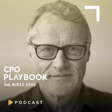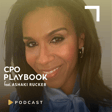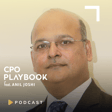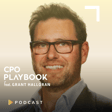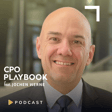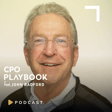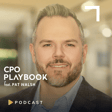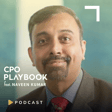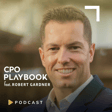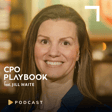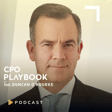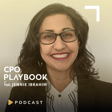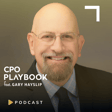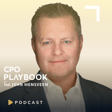Introduction to CPO Playbook Podcast
00:00:01
Speaker
I'm Felicia Shakiba, and this is CPO Playbook, where we solve a business challenge in every episode.
Economic Impact of Menopause
00:00:15
Speaker
a Mayo Clinic study cited by the New York Times, menopause costs American women an estimated $1.8 billion dollars in lost working time each year. Despite affecting around 1 billion women worldwide, many in the workplace may not even realize they're experiencing perimenopause or menopause. This could be your wife, sister, colleague, or even you. Without awareness, women can't ask for the support they need. The U.S. Census data reveals that over 15 million women aged 45 to 60 are in the workforce.
00:00:53
Speaker
and many may be unaware of the changes their bodies are going through. Medical expenses for perimenopause and menopause are soaring to a staggering $26 billion dollars annually, nearly rivaling the combined costs of hypertension, diabetes, smoking, obesity, and unhealthy habits, which total just $10 billion dollars more.
Marie Kerr's Personal Story
00:01:15
Speaker
I'm joined by Marie Kerr, Head of Creative Global Business Brand at Reddit, who will share her own personal story with us. Marie, thank you so much for being here. Thank you so much for having me. I'm really excited to talk about this. Marie, can you start by explaining what paramenapause is and the typical timeline and symptoms that women might experience?
00:01:41
Speaker
Absolutely. I love your podcast voice. It's terrific. So let me start by saying I am not a doctor. I am not a trained medical physician in any way, but I am a human being experiencing perimenopause.
00:01:56
Speaker
And I have a tendency to go all in on things I'm up to. So I've done a lot of research. So the word para-menopause literally means around menopause. And menopause is specifically the one day that is 12 months from your last period.
00:02:16
Speaker
So that could be anywhere. I believe the National Institute of Aging said that it's somewhere between eight to 10 years long. It can be up to 14 years long. Yes. It typically happens in your early forties to fifties, but we are seeing people getting it younger, younger. There is precocious pyramidal pause or people getting into this phase of their life in their early thirties.
00:02:45
Speaker
So it is a very interesting experience. Would you like me to give an overall description of what's happening to the body? Yes, please. Okay, so what's happening typically in para-menopause is that your ovaries are producing a little less estrogen, and we need estrogen for everything. Men have estrogen in their bodies, and so that diminishing estrogen is causing a lot of hormonal upheaval. There's of an un-misbalanced between estrogen and progesterone,
00:03:17
Speaker
and your hormones fluctuate throughout the day, causing a variety of symptoms. And those symptoms are vasomotor, which most people associate like hot flashes, night sweats. There can be urogenital ones. These are ones that people typically are a little shy to talk about like vaginal dryness, urinary incontinence.
00:03:39
Speaker
just fibroids in the uterus. These are uncomfortable things, but they're real things that happen to people. Sleep disturbances. I mentioned night sweats already, but you can also have insomnia.
Work and Personal Life Effects
00:03:52
Speaker
There's a thing called cortisol awakening response that gets you up pretty early with a flush of cortisol, which is the stress hormone. And they're a cycle Logical ones, mood disturbances, anxiety and depression are frequent and early symptoms of perimenopause. Brain fog can be something. One thing I've read about on forum, sorry, this is so many things, perimenopausal rage.
00:04:18
Speaker
man Wow, what a fun, sexy time for us. And then there are like the general physical symptoms. So skin changes, like your complexion can change. There can be hair loss. Again, estrogen is so helpful for all of these things with your soft tissues, mucous membranes. Hair loss is a rough one. Osteoporosis, bone loss.
00:04:39
Speaker
palpitations, fatigue, and there are a lot of symptoms. I can't recall offhand, but I think it's 37 different symptoms associated with perimenopause and it's because your hormones are changing and that upheaval is disrupting your status quo and it's challenging for your body to adapt. Wow. So it sounds like there's just a lot going on with women in this But or some women in this age bracket. And that could essentially affect a lot of things, both your personal life and your work life. Yes, I don't want to be a scaremonger. I've listed a lot of potential symptoms of Paramanipause. About 80% of women, I understand, will experience some of these symptoms, particularly vasomotor or mood disorders. But yes, there is a lot going on. Would like to say not everyone experiences these things. I was reading very recently and I believe r slash menopause, which is a subreddit that there are some people who have had no idea. They had an IUD, they had it up and they were already postmenopausal. Amazing. No symptoms. And then it's a gamut. Everyone is different. Your mileage may vary. Interesting. Okay. So how did you first become aware that you were going through a pair of menopause and what were some of those initial challenges that you might've faced?
00:06:02
Speaker
It's very interesting because I don't think I reflected on it until you've asked this question. I would say there was a point at which I started feeling that there was something wrong. And I said to a colleague, and this was before I was at my current workplace, I said to a colleague, I think I'm having a nervous breakdown.
00:06:20
Speaker
I just felt so wrong. Something was wrong. I felt anxiety for the first time. And I had never experienced this before. And my sleep was weird. And I couldn't figure out what was going on. And the symptoms just cascaded from there. I started getting sleep disturbances. I started getting night sweats. I started getting hot flashes.
00:06:46
Speaker
And it was all very surprising. And of course, if you add things up, when you list it out loud, like I just did, that sounds like parametopause, but no one had ever talked to me about parametopause before. No one had educated me about it. So I didn't really know what was going on. And I remember just Googling for a while, what are these symptoms I'm having? And someone suggested parametopause in one of the forums I read and I went to a doctor and unfortunately,
00:07:16
Speaker
As is the case sometimes, she was rather dismissive. She said, you're too young. You probably just need to lose some weight, even though by the age I was then, my mother had already completed menopause. She was post-menopausal.
00:07:31
Speaker
So even with the background, even with the symptoms, she just dismissed it. And so I, for a while, just thought, oh, I've developed anxiety and depression. And I went to psychiatric care for that and started taking medications. So it took a while for me to actually come to this conclusion. And luckily, I found like a physician who was like, oh, have you considered that it's perimenopause? And the treatments since then have been tremendous.
00:07:59
Speaker
Wow. I'm very happy that you found a doctor that was able to pinpoint what the challenges were coming from. And thank goodness for that doctor. Absolutely. And so I want to go into a couple other things, which is one being once you realized what this was, how did you approach having open conversations about your perimenopause experience?
00:08:24
Speaker
with your colleagues? What were their reactions? It's so interesting. Not everyone has this luxury, but I very much enjoy being myself at all times. I find it very challenging to pretend or obfuscate ah subterfuge is really anathema to me. So I didn't have an approach. I simply continued to be myself.
00:08:50
Speaker
And myself, especially at my current workplace, is welcomed. I don't know how
Workplace Support and Empathy
00:08:56
Speaker
familiar you are with Reddit's mission, which is to bring community, belonging, and empowerment to everyone in the world. But it is a workplace that very much welcomes one's authentic self. So I was very active in our ERGs, like Ability, Reddit Asian Network, Women of Reddit.
00:09:13
Speaker
And so what I did was continue to be myself, but now in Paramount applause, which is posting to our Slack channels. Women have read it period yelling, which is one of my favorite Slack channels where you just post. I love that i think every organization.
00:09:29
Speaker
like channel her penopause are not Yes, period yelling is amazing. And I just started posting there and in slacks about what's going on with me. And I got support people who are experiencing the same things.
00:09:45
Speaker
people from different sides of the organization that I would never meet in my day to day were coming like, me too sister, this is happening. And it was so great to just know that other people were experiencing it, hearing from them. And also surprisingly, it was really validating to hear from people who were not experiencing it, but were curious about it because it might happen to them or someone they love. And And that was so helpful because I think there is this massive stigma around being in this age range, even though it can happen quite young, that to experience perimenopause or menopause. And it really helped diminish that perceived stigma because I was hearing so many positive things from other people. Maybe not positive. Let's get real. Some of it was terrible. But people were responding in a positive way to knowing each other, knowing our own experiences.
00:10:38
Speaker
I think it's fair to say that most people know at least one person going through this, whether it be their mother, their wife, their sister, their best friend. You know, so I feel like it's really that type of communication is not just for people with perimenopause. It's maybe people who are like, how do I handle this with my colleague or my best friend in the organization?
00:11:03
Speaker
And so what did that do for you when you got that feedback and that community and that feeling of belonging, it sounds like? What did that do for you? I think I am not alone. or This will sound ironic. I am not alone in feeling that paramenapause is an isolating experience. It feels like something has come over your body. It's so physical. You don't understand what's happening. And sometimes I feel like a stranger to myself. What is happening? My body is betraying me. And so when you're feeling this isolated, having that response
00:11:34
Speaker
having those people share with you breaks down that isolation, helps you feel connected. and And we're a remote company, primarily there are offices, but I'm connecting with people internationally, different departments, different locations. And they're there when I'm there online sharing our experiences. And I can't say enough about how much it helps just to know someone else is going through this with you.
00:12:02
Speaker
It really does heighten that sense of belonging, what it sounds like. And sense of belonging is really important, not just in your personal life, but at work. If you don't feel like you belong at work, there's a pretty good chance you're going to leave that organization fairly soon. And I can only imagine how much that community or that feeling of community has really allowed you to thrive in your own space at work.
00:12:34
Speaker
i think that we've discussed this on our previous call but the impact economically to women is huge during perenopause and i can imagine that some of it is this isolated feeling as though you can't share with other people
00:12:50
Speaker
23% of people in Paramanopause will leave the workforce. I don't have the number in front of me, but it's quite a lot of women. And I know that right now there's an estimated 47 million women in the US alone.
00:13:05
Speaker
who are menopausal or post-menopausal, and forgive me for reading out a set. They're estimated by 2030, the world population of menopausal and post-menopausal women will be 1.2 billion, and 47 million people who have had uteruses at some point will become part of that group every year. It's a huge amount of people who are not connecting, not feeling like they can be themselves at work,
00:13:32
Speaker
feeling that they have to leave the workplace because of their symptoms. And that's a tragedy. It's an astounding number. And so being at Reddit, I'd love to learn more about what type of support have you received to help manage your wellbeing and is the support that they're providing working for you. I know you've mentioned the Slack channel and that sounds like I said, every organization should have period yelling know at some point. What's working for your well-being? I think a huge part is my boss. So I have a boss who is in my age range. And when the symptoms got really bad for me, I got very self-critical.
00:14:16
Speaker
I'm used to performing at a certain level and I'm tired and I'm moody and I'm hot all of a sudden and ah just didn't feel like I was doing well. So I went to her and I'm like, I don't think I'm doing well. I think I'm failing. And what was helpful about that was getting outside your perspective. She didn't think I was failing. She thought I was doing a good job.
00:14:37
Speaker
hey, maybe my hormones and what's going on with me, my lack of sleep are impacting my judgment and my self-assessment. So that was really helpful. It was also helpful to have a person who is an authority figure share with me that she, again, had very similar experiences where she was going through some hormone challenges,
00:14:57
Speaker
the Doctor was dismissive. She insisted on treatment. The treatment helped her tremendously. And she said she would go on record as an advocate for the treatment she received. So I hope everyone can have a supportive boss. and Maybe they won't necessarily have a boss that can relate to their specific experiences. I was very lucky there. But that was helpful. I did reach out to my HRBP.
00:15:22
Speaker
and just see what kind of services are available to me. And we have Carrot and Lyra. And so I think a lot of companies have Carrot, but everyone I know associates it with strictly like fertility. But the menopausal transition is part of fertility and they have services for for perimenopause and menopause. Had no idea until I spoke to HR. And then, I mean, I haven't used Carrot. I haven't used Lyra personally. But just being armed with this knowledge, people have reached out to me because I'm so open about it. And I've been able to help them get hooked up with Carrot, get hooked up with Lyra, because it's so overwhelming. You need support. And thankfully, we have services to support her.
00:16:08
Speaker
What do you think men's roles are in these situations? How can they best support the women that they work with, with whom might be having the same experience? Well, I certainly can't speak for men on behalf of them. I want to say
Coping Mechanisms and Support
00:16:27
Speaker
that I hope that men's roles are similar to everyone's role in this, which is be a good human, be a supportive colleague,
00:16:36
Speaker
and be open to the experiences of others. I think I did have some tips in general. First, let me say that some of the most engaged people, most supportive people, when I've been open about parametopause have been men. Male colleagues, I briefly... Oh, go ahead. No, really. I'm just my... yeah
00:16:59
Speaker
Yes. There was a brief period where I considered having my own podcast about parametopause in the workplace. But unfortunately, it was rather taxing the stories that women shared were not all as positive as mine. And it was very disheartening to hear some of the struggles that people had gone through. But I was posting about those openly on LinkedIn, which I was told later felt like a really dicey thing to do, but the most active engagement came from men. I remember David from Supermoon reached out and it was like, I am so grateful you're going to do this. My wife is experiencing this and she works and no one is talking about it at all. And I can consistently received really positive feedback from men. And interestingly, a colleague told me she felt
00:17:50
Speaker
that women weren't engaging with this content because she they would be outing themselves because of the stigma. They might be letting people know how old they are, letting them know that they might be experiencing something with their mood or physical health, and where men didn't necessarily run that risk, but then could express their support on behalf of others.
00:18:09
Speaker
So yes, men are surprisingly supportive that I found. That's fantastic. And I think that men do have a very important role in this type of situation. Like the like I said before, like those who have wives and colleagues and sisters, men are also surrounding this type of experience.
00:18:29
Speaker
and can be the ones to have that empathy and remind you to be good to yourself, even when you're not always going to be at the top of your performance 24-7. We're human, and we have things happening to us and to our body, and especially at this age. How have you coped with the emotional and psychological impacts of Paramanipas at work?
00:18:56
Speaker
Oh, it's been very challenging, frankly. I would say I struggled and I struggled a little less and I continue to struggle a little less every day. So I think at first there's the denial because there is that stigma about age. And then you're just like, this isn't happening to me. I'm young. i I still want to believe that's not me. It's just been hard. I have therapy.
00:19:21
Speaker
I have support. I have friends. I have family. I have support at work. My physicians, now that I've gotten all my ducks in a row, are incredibly supportive and responsive. I have been open to discussing therapies that I've been interested in. And for me, hormone therapy has been game changer, especially for the mood disorder stuff. It's an incredible difference that for me. If I may be incredibly frank and possibly TMI about it, one of the possible symptoms I mentioned was like fibroids and I had surgery earlier this year and that surgery helped tremendously because the things in your uterus unfortunately can impact your hormones and the hormone fluctuations you experience daily impact your mood and so you're going through this roller coaster every day and
00:20:11
Speaker
I think just the anxiety of what the roller coaster is is so challenging. That surgery, terrified of it, primo. Excellent. Literally would do it again. My first surgery ever was terrified. It was such an incredible help. Again, I'm not a doctor.
00:20:26
Speaker
No, but I think that there's going to be women that are, like I said, are experiencing the same thing and to know that they have that option. Ask questions and be curious. I think it's really important to mention, in your opinion, what's the biggest misconception or lack of awareness around perimenopause that really needs to be addressed?
00:20:48
Speaker
Lack of awareness is the biggest lack of awareness. People simply don't know that this is a thing. Women within my age range, that with whom I work, are like, what's parent menopause? Never heard of it. Personally, until it happened to me, my perception of menopause was, one day my period will stop and I'll have hot flashes maybe.
00:21:12
Speaker
And that was not a very robust picture of what actually goes on. Only when it happened to me did I understand like the full picture of what could go on. So just awareness in general seems to be lacking. But I will say not to be very negative. There is a huge increase lately. I don't know if you've seen it. like People openly talking about the menopausal transition. A femtech got like wicked money over the last several years in startups. There are a lot of incredible startups with like telehealth, even IRL clinics that specialize in the menopausal transition.
00:21:51
Speaker
I know the North American Menopause Society rebranded to be menopause dot.org. There are just so many things. like An old research study that suggested that hormone therapy was highly associated with breast cancer was shown recently to be overblown and that Unfortunately, a lot of women were denied hormone therapy based on not the best positioning of research because the incidence of breast cancer as a result of hormone therapy was largely overblown. There are a lot of good things happening. People are talking about it. Celebrities are talking about it. And people are making big investments. It's a big audience that you can market to. So people are like VCs are
00:22:36
Speaker
and funding startups. I'm very happy to hear that the word is getting out there. And to be quite honest, I didn't even know what that was until you mentioned it to me. No, I'm very thankful for you to share that. And what do you think organizations should be doing to better support women experiencing perimenopause in the workplace?
Awareness and Education Advocacy
00:23:03
Speaker
education. Clearly, there's a lack of awareness. So if there can be educational programs purely opt-in, not mandatory, where they could just give people the option to learn about reproductive health in general, amazing. Or maybe give them this episode. Yes, absolutely. It's just put it in one of the trainings and they have to click through. But absolutely, just education certainly We have all kinds of different options at work. I know that we have an education session about like infertility treatments once, but I haven't seen anything about perimenopause quite yet. So I would love to see that. It's weird just talking about it in our benefits training or when you're talking about benefits because I did know that we had carrot and I did know that we had a stipend for fertility and reproductive health.
00:23:50
Speaker
But I didn't know that parametopause was part of that. It didn't even occur to me until I spoke to an HRBP about it. So if they could be more open. So absolutely education. I know that we've had educational sessions in the past at Reddit where we learned about like different infertility treatments.
00:24:09
Speaker
But wouldn't it be wonderful to have, like, parametopause sessions where we can learn about parametopause and what to expect? We have caret benefit. We have a stipend, in fact, for reproductive health. I wasn't aware. And I've been here almost six years. That included the menopausal transition, which is part of reproductive health. So habituating the information, making it available to people, letting people know right off the bat when they're onboarded, reminding them of every time our benefits change at the end of the year or renew, that would be incredibly helpful. Because honestly, even if they had told me that there was support for perimenopause, I might not have thought about it until it came time for me to need it, at which point I wouldn't even know where to look.
00:24:55
Speaker
So just keep putting that message out there that support is available. There are so many women in this workplace and so many people who have had uteruses that it's going to affect them at some point. ah For those who are men or those who are maybe not at that age yet, for them to just be aware how they can be supportive to their colleagues who might be going through this is also important.
00:25:23
Speaker
andm Absolutely. I think we just need to start that open discussion. And I do think about this every time I post, like someone will ask about it. I posted, I think last week, this is so timely, about it period yelling. How about that peremana pause was kicking me in stuff. And it was so hard. And a younger colleague were like, hey, tell me more.
00:25:51
Speaker
And I, in all caps, told her more for several paragraphs because it is period yelling, and you must yell, but never put an exclamation mark. It's all caps only. Anywho, then there's like responses to that. Maybe someone is shy about asking, but someone is out there and asking. And then other people see the information. The more they see it, the more comfortable they get around it. And yeah, we'll all be better off if we could just talk more openly and be ourselves.
00:26:18
Speaker
Is there any other advice that you would give to women who may be going through perimenopause but are unsure of what's happening or hesitant to speak up? I'll first say, if you're hesitant to speak up, that's okay. You don't have to. Whatever you're comfortable with is what's right for you. You are going through an incredibly uncomfortable experience,
00:26:44
Speaker
Make yourself comfortable. Give yourself whatever comforts you can. It's hard. If you're not sure what's going on, there are so many resources out there that you might not know of. Of course, I'm going to plug subreddits. Like we have several subreddits that you could go to. Here are just like three that were helpful to me. R slash menopause, who'd have thunk it? R slash two X chromosomes. You know, that's a dicey one. But R slash witches versus patriarchy was surprisingly a very helpful one. and And then there are, you know, ah there's a wealth of information, like the Mayo Clinic has some wonderful information. The North American Menopause Society, which is all called menopause dot.org, they post on Instagram. There are startups and apps that FemTech Explosion is out there ever now. Perry, Midi, Genev, Winona, there are so many more than that.
00:27:38
Speaker
So you can have telehealth, you can meet with someone. When you go to the NAMSS website, northamericanmenopausesociety.org, you can find a certified NAMSS practitioner. Risa Kagan is a physician in San Francisco and has been working in gynecology obstetrics for her whole career. She told me that most physicians that are practicing today probably spent maybe a half an hour to an hour learning anything at all about menopause.
00:28:06
Speaker
during their general training. And her feeling was that practitioners now are about 10 years behind the actual science. That's incredible. She is really on the front lines of it. So if your physician is dismissive, you feel like you're not being heard, you can push back.
00:28:28
Speaker
you can find help you need. And I'm not saying see every doctor, I know that's not feasible for everyone depending on their healthcare plans, et cetera. But there are things like telehealth available to you where it might be possible to find a practitioner or a healthcare professional who's more educated about specifically perimenopause. Is there anything else that you want to share before we close this combo?
00:28:55
Speaker
Just thank you so much for having me because I'm so passionate about this topic. I really want people to start feeling comfortable with going through peremendopause. Okay, absolutely. You may not feel comfortable physically, emotionally. It's rough. But like talking about it, cool. Let's do it. Let's talk about it. Because feeling less isolated is amazing, and we live in an increasingly isolating world.
00:29:24
Speaker
Connect. Talk to people. It's so powerful. It really boosts your mood. It helps you cope in really hard times. I'm rooting for you people. Good job. I love that. Marie, thank you so much. You are so brave. And thank you for sharing something so personal to you. And I think that because you have shared, you have likely made so many more people in general, not just women, but just people help understand what they can do, both personally and professionally at work.
Conclusion and Listener Engagement
00:30:04
Speaker
I'm hoping that this reaches as many people as possible so they learn and they're more aware of what's going on. So thank you. I hope so too. Yay. That's Marie Kerr, head of creative global business brand at Reddit.
00:30:21
Speaker
If today's episode captured your interest, please consider sharing it with a friend or visit cpoplaybook.com to read the episode or learn more about leadership and talent management. We greatly appreciate your rating, review, and support as a subscriber. I'm Felicia Shakiba. See you next Wednesday and thanks for listening.

